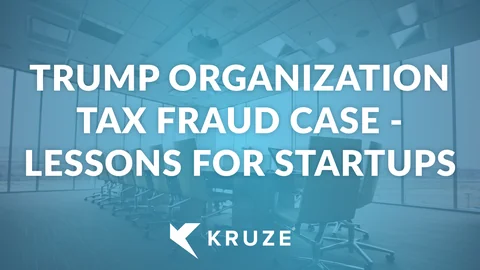
Companies love offering indirect benefits to their employees. Employees love receiving these indirect benefits and perks. But, do you know that many of these perks are taxed? Not reporting this is considered tax fraud. Let’s discuss the tax treatment on these employee perks.
What sparked this as a potential video and blog topic is that the Trump organization’s CFO has been indicted for tax fraud for not reporting indirect benefits. It is a real-life example that can be used to further explain the situation.
Sometimes our startup founder clients ask us if they can take advantage of indirect benefits themselves as well as offer them to their employees. So, this is an important topic to address.
As for the Trump CFO case, it was around $1.75 million of tax fraud. He did not report indirect income on his W2. The list of unreported indirect benefits not reported included things the Trump organization was paying for like —his apartments, his cars, private school tuition, utility expenses, and garage expenses. It was reported that he also did not run this through payroll and paying payroll taxes.
It is ok for the company to pay for the above mentioned items, but it needs to be taxed. The IRS taxes this type of income, even though it’s not in your salary.
How Best to Report Indirect Benefits:
The correct way to do this is to add line items on the payroll every month for the employees that receive indirect benefits and perks. Both the employee and the company need to pay tax on them.
What Happened in the Trump CFO Case & What You Can Learn From It?
The Trump organization was not listing these items on payroll or paying taxes on them.
What can your startup learn from the Trump CFO cae?
You may be tempted to pay for the following perks on behalf of the startup founder:
- Rent
- Cars
- Gym memberships
But, resist the urge to do so. The IRS is doing their best to audit this activity. They may miss you initially, but you want to do things the right way.
In creating a startup, the intent is to to build a giant company. The goal shouldn’t be to try to save a few bucks on your apartment, right?
So learn from the Trump CFO real-life example.
As always, if you have any questions, contact the startup accounting and tax experts at Kruze Consulting. We answer questions once a week, from a well-intentioned founder trying to figure out what’s reasonable, what they can expense, and what needs to be run through payroll taxes.
So just remember, if it feels too good to be true, and you’re getting a bunch of things paid for by the company, it means you probably need to be running that through payroll taxes. You don’t want to end up having the Feds knocking at your door someday.











